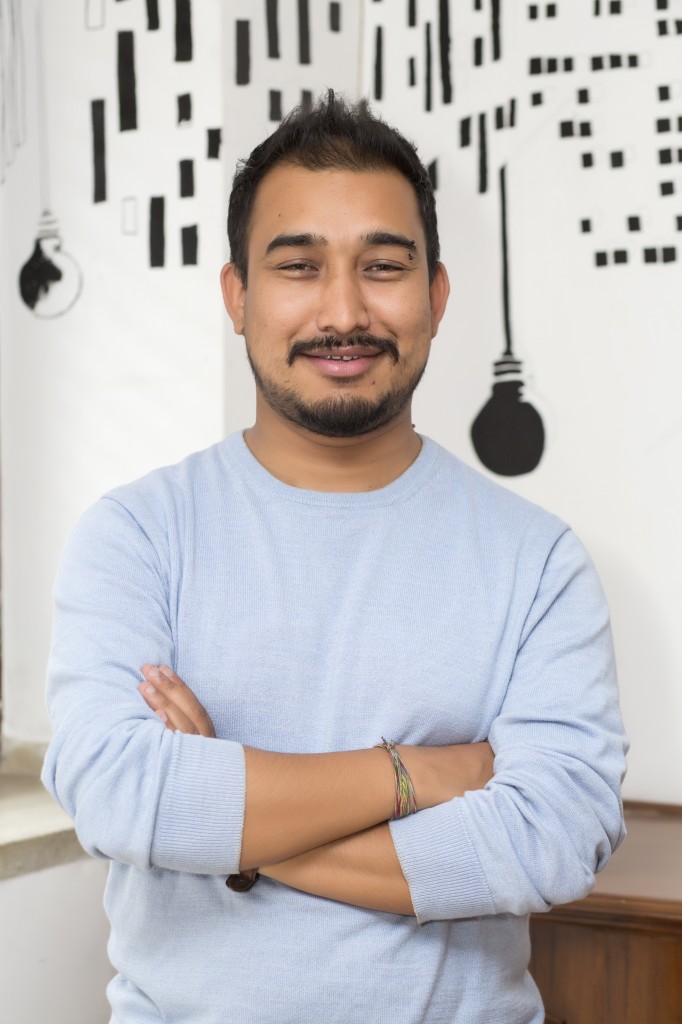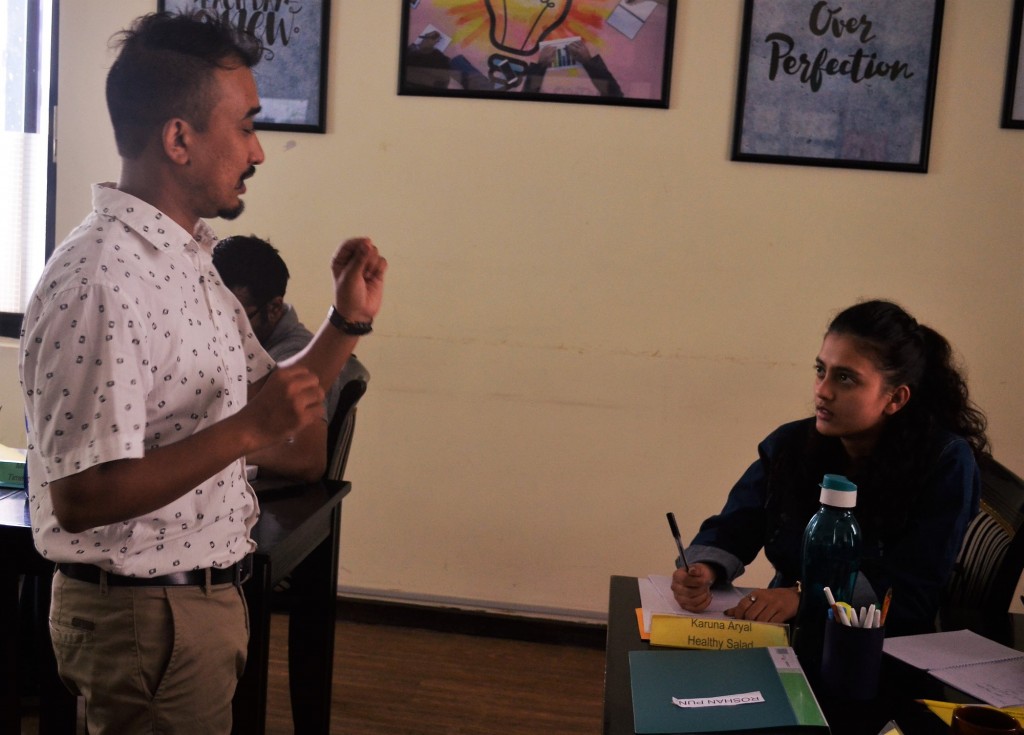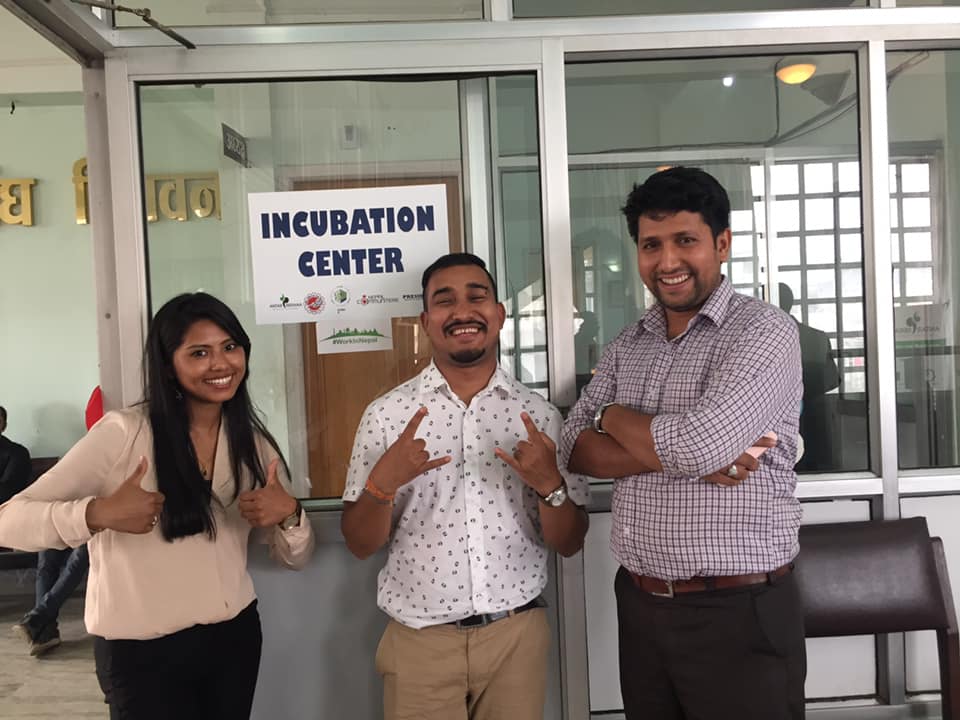
On any given day, you’ll find Anil Parajuli at a road side local tea shop or a restaurant of his choice engaged in close conversation with an I-Cube entrepreneur, or one of the many entrepreneurs in Nepal that he mentors, supports, or is friends with.
Anil is one of our dedicated I-Cube Business Incubation Program’s Officers. At Nepal Communitere, Anil mentors entrepreneurs very closely focusing on their growth and survival. He draws from his own experiences being an entrepreneur, having started a number of his own businesses in the last 7 years. Anil deeply values the importance of continued learning, and in addition to mentoring entrepreneurs at I-Cube, also teaches entrepreneurship to undergraduates at Universal College. He has been involved with various institutions that focus on entrepreneurship and education, such as Antarprerana, Job Dynamics, Samriddhi Foundation and Kathalaya Inc. Anil has an MBA in Entrepreneurship, and an undergraduate degree in Development Studies.
You are an entrepreneur yourself, and have been for a couple of years now. Can you tell me a little bit about your experience being an entrepreneur?
I’ve always been a foodie, and my startups have been in the food sector, because I thought I could channel my passion for business. I would turn into a food critic every time I went out to eat, so my friends would always say “why don’t you start your own restaurant then and show us?” I started my first enterprise in 2013, after I had just finished college. It was a honey farm called the Busy Bee, where I sold a limited quantity of hand processed, organic honey. It unfortunately came to an end when the earthquake destroyed the farm. After that I started Cactus, a themed restaurant and bar, and a coffee shop called City Coffee House. I believed we needed quantity and quality food that’s healthy too, and is worth the price we pay, and this is why I started my own restaurants. I also refurbish and restore old bikes and I sell them again.
What is your main takeaway about being an entrepreneur in Nepal?
Many startups in Nepal are based on assumptions. Entrepreneurs who are starting out have a lot of assumptions at the beginning, and go forward with their businesses based on these assumptions. This is what I did too, and this is also what I have seen. There isn’t much of a trend to do market research and get feedback. You assume something might work so you do it. Human-centered design that we teach through our I-Cube Program, where you go and get meaningful feedback from your customers, changes your process or product.. This process is really limited among our entrepreneurs.
You’re also an educator, mentor and business coach– you teach at Universal College, and coach I-Cube entrepreneurs.Can you tell me a little bit about what you teach, and why you teach?
The main reason why I teach entrepreneurship and business is to show that there are possibilities in Nepal; that there are so many opportunities to earn money here. When I teach, I mostly include cases from Nepal: cases where Nepali businesses and startups do well. I not only share failure stories, sometimes when I tell people success stories from Kathmandu or Nepal, they get wide eyed and even get goosebumps.
The main reason I got into teaching entrepreneurship and business in Nepal is because I was struck by the fact that around 6 bodies are brought back to Nepal every single day. If I can convince even one person to work in Nepal, or if I can give even one person a job, then it’s something. People go abroad to work for financial help, because making money here is hard; this creates such a ripple effect. Bonds between families are weakening, and we’ll see the effects of this in the near future.

What is an overlooked component of entrepreneurship in Nepal that’s often forgotten or ignored, but needs attention?
As much as entrepreneurship is needed in Nepal, the whole concept has been quite glamorized, so people jump into entrepreneurship very quickly here. In the US, the average age at which people become entrepreneurs is 40. But here, friends get together, pool their money and start something almost immediately after college. Often times when it’s this quick, there’s usually no team diversity, people have the same skills and thoughts, and lack experience. The hard work and mindset that entrepreneurship requires gets sidelined.
And being an entrepreneur is hard. Many times you’ll just be thinking a lot about how to pay rent and make ends meet. As a new startup, it’s inevitable that you will get sucked into the day to day minutiae; this type of hustle is part and parcel of entrepreneurship. However, for the business to grow the entrepreneur will also need to grow and evolve beyond just hustle. Entrepreneurs sometimes forget their own personal growth. To evolve into thoughtful decision makers for their business, to have a strategy for their business, to delegate and manage their time effectively and toggle short-term oriented daily operations with long-term strategic planning. You need documentation, you need to have an agenda, you need to do research. It’s also important to have work experience, do internships, and learn from other people, and most importantly work hard. It isn’t enough just knowing about things and having them in your head. And only when you’ve put in all of this work, and taken your work seriously do you get investment.
You have invested in a number of startups, and you strongly identify as an investor. Why do you invest?
I’m not investing in startups because I’m looking for immediate returns. A lot of us who provide seed funds are investing because we believe in the cause, not because we have money. I’ve invested in Kavach (safety gear), a Chicken farm, and an IT company, and they weren’t large investments, they were small scale investments of 1-2 lakhs each. It much be the first time in Nepal that startups are receiving seed funds, and it’s good that people are doing it, because this is what driven startups here need.
I’m also an entrepreneur, but when I see people who have the passion and drive and are working hard, I know they’d do more with the money and make that seed investment go a lot further then I could. I especially believe in startups, and will invest in them if they are purpose driven.
